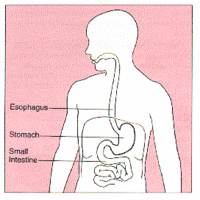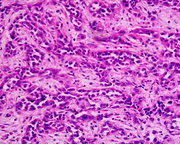Stomach cancer
In medicine, stomach cancer (also called gastric cancer) can develop in any part of the stomach and may spread throughout the stomach and to other organs. The cancer may grow along the stomach wall into the esophagus or small intestine. more...
It also may extend through the stomach wall and spread to nearby lymph nodes and to organs such as the liver, pancreas, and colon. Stomach cancer also may spread to distant organs, such as the lungs, the lymph nodes above the collar bone, and the ovaries.
When cancer spreads to another part of the body, the new tumor has the same kind of abnormal cells and the same name as the primary tumor. For example, if stomach cancer spreads to the liver, the cancer cells in the liver are stomach cancer cells and the disease is metastatic stomach cancer, not liver cancer.
A well known complication of stomach cancer is when it spreads to an ovary; the tumor in the ovary is called a Krukenberg tumor. This tumor, named for the doctor who first described it, is not a different disease; it is metastatic stomach cancer - the cancer cells in a Krukenberg tumor are stomach cancer cells, the same as the cancer cells in the primary tumor.
Epidemiology
Stomach cancer is more prevalent in China, Japan, Korea, and other countries in Asia and South America, than in the United States.
Infection with H. pylori is the main risk factor in about 80% or more of gastric cancers.
Symptoms
Stomach cancer can be hard to find early. Often there are no symptoms in the early stages and, in many cases, the cancer has spread before it is found. When symptoms do occur, they are often so vague that the person ignores them. Stomach cancer can cause the following:
- Indigestion or a burning sensation (heartburn)
- Discomfort or abdominal pain
- Nausea and vomiting
- Diarrhea or constipation
- Bloating of the stomach after meals
- Loss of appetite
- Weight loss
- Weakness and fatigue
- Bleeding (vomiting blood or having blood in the stool)
Any of these symptoms may be caused by cancer or by other, less serious health problems, such as a stomach virus or an ulcer. Only a doctor can tell the cause. People who have any of these symptoms should see their doctor. They may be referred to a gastroenterologist, a doctor who specializes in diagnosing and treating digestive problems. These doctors are sometimes called gastrointestinal (or GI) specialists.
Diagnosis
To find the cause of symptoms, the doctor asks about the patient's medical history, does a physical exam, and may order laboratory studies. The patient may also have one or all of the following exams:
- Fecal occult blood test
- Upper GI series
- Gastroscopic exam
Abnormal tissue seen in a gastroscope examination will be biopsied by the surgeon or gastroenterologist. This tissue is then sent to a pathologist for histological examination under a microscope to check for the presence of cancerous cells. A biopsy, with subsequent histological analysis, is the only sure way to confirm the presence of cancer cells.
Read more at Wikipedia.org




